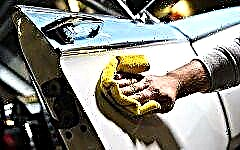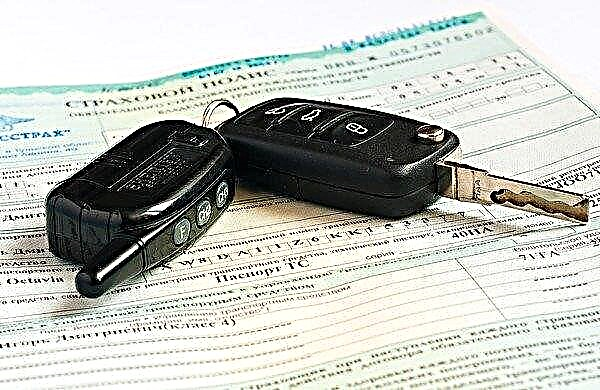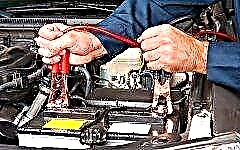
When purchasing a car on the secondary market or through a used car sale service, it is necessary to conduct a thorough check of the "cleanliness" of the car. Unfortunately, it is not uncommon for buyers, having quickly completed a deal, after a while begin to litigate with banks and credit institutions, because the car turns out to be a pledge or credit one. How to check whether a car is pledged or not in order to completely protect yourself from unscrupulous sellers?
Does the car owner always know about the car pledged

Do not think that everyone who sells vehicles knows everything about their property. Almost 10% of those who take out loans from banks do not know that, apart from real estate, their car is also used as collateral. Such situations occur for two reasons: the borrower's inattention to the documents that he signs, as well as the bad faith of the manager of the credit institution, who does not explain in detail what property is the collateral for the loan.
And if such a person decides to sell the car, he will be surprised himself that his property is pledged. This is a rare case, but must be considered. In other cases, the owner of the car knows about all the restrictions on the vehicle and deliberately misleads the buyer.
Credit and pledge car - what is the difference

For a buyer, there is practically no difference between a credit and a mortgage car. In both the first and second cases, after buying a car, he becomes a debtor to the bank. But if pledged cars are entered in all state registers, and they can be checked and the corresponding certificate of verification can be requested, then the situation with credit cars is much more complicated.
Credit cars are those cars that are purchased with a car loan. At the same time, credit cars can also act as a loan guarantee, that is, be collateral.
A mortgage vehicle is a vehicle that provides a guarantee for the payment of a consumer loan, instant loan, and other banking transactions related to the loan.
Vehicle Inspection Methods

95% of Russian banks and credit institutions provide car loans only with the compulsory compilation of CASCO insurance. The insurance contract specifies who will receive compensation for an insured event - for credit cars it is always a bank or financial organization that issued a loan for the purchase of a car.
If a car is purchased on the secondary market just (from 3 months) from the salon, it is necessary to check the sales contract. The contract specifies how the vehicle was bought: a loan for 1-5 years, it was paid in full, etc.
It will not be superfluous to visit the salon or call the manager to check whether the car was bought on credit or not, if there is a suspicion that the car was bought from a dealer.
Unfortunately, none of the verification methods can give a 100% guarantee.that you are buying a "clean" car without debt. The reason is simple: not all banks transmit data to the state register on time, they rent a car on time as a collateral after the loan is repaid. There is a delay between the departments in the transfer of data, failures when updating the database, etc.
Before making a purchase and transferring money, the buyer must independently check the collateral of the car he liked. Almost all sellers who want to sell their car agree to provide the necessary data for verification: wine code, body, engine numbers, screen or photocopy of PTS, etc. The verification is carried out in all official databases where information about the property of citizens that is pledged is placed and Internet services:
- traffic police base;
- FSSP service;
- credit bureaus;
- NBKI service;
- notary chamber;
- Internet resources.
Many open government databases provide written information on the results of the check (whether a particular car is listed as a pledge or not). Such a document will serve as evidence in court if the credit institution makes a claim and wants to take the car.
Traffic police service
Many motorists call the traffic police base a large sieve, into which only cars with a very dubious past fall. And if all stolen cars are present in the database, then whether the deposit is hanging on the car or not is not always displayed. The check is carried out free of charge according to the wine code.
On the main page, you need to enter wines, and after a few minutes the service will provide the following information:
- whether the car is on the wanted list;
- the number of fines;
- is there a ban on registration actions (bail, arrest).
The main disadvantage of checking on the traffic police website remains that the department does not provide a written or electronic document on the results. Screens of a PC or smartphone screen that the buyer checked the car through the database are not considered in court.
The network contains up to 10 services that promise to check the car for a pledge. The portals cooperate with many government services and update their databases every 7 days. The buyer needs to know the car's wine code, for some services it is necessary to drive the wine and body number into the check fields.
In most cases, checks are paid, they are carried out online in 5 minutes. The main drawback of these sites is that data on the procedure cannot be provided in court.
Verification through a notary

Since 2014, on the basis of the notary chamber of the Russian Federation, a unified register has been created, which displays all the property of citizens that is pledged. A separate item is the accounting base of all vehicles that have state registration and are currently pledged by financial institutions.
The disadvantage of checking through the register of the Federal Notary Chamber it is considered that banks and pawnshops are not required to provide information about their pledge operations and enter them into the database. Banks provide reports only on a voluntary basis, therefore, when checking a car through a notary, one cannot be completely sure that a particular car is not burdened with a pledge.
And if a recommendation has been developed for banks that it is desirable to send all information to a single state register, then the situation is different with pawnshops. Not many pawnshops transmit data on pledged property, since the sending procedure is paid, while for banks it is free.
The advantage of the appeal is that you can get a written or electronic extract from the database, which is considered an official document and will be accepted as evidence of the audit carried out in court, but only if there is the same document from the financial structure and the FSSP.
Check through the FSSP
The database of the Federal Bailiff Service at the moment is the most complete, therefore, checking a car through the FSSP is considered the most reliable. The check is carried out free of charge, for a written statement you must pay a set payment of about 150 rubles.
On the official page of the department, you must enter the name of the seller, region. Within a few minutes, the database will give a detailed history of all the restrictions on a particular car: when and by whom the fine was issued, is there a debt to the service for unpaid alimony, loans, is the car under arrest, etc.
Checking via mycar-info.ru
You can check the car for collateral through the online service of the partner of the National Bureau of Credit Histories. The database of the mycar-info.ru data service has been collected since 2011 and by 2020 includes 2.9 million vehicles. The Bureau's database provides reports from more than 1200 organizations that are engaged in car loans.
The check takes a few minutes and is carried out online 24/7.To check, you will need to know the car's wines, the number and series of the TCP. If the car is pledged, the report form will indicate the bank or financial institution that issued the loan, the end time of the pledge. Checking is paid.
Car check with a financial institution
The most difficult way to check a car, whether it is pledged or not, is the option of checking the databases of financial institutions and a direct appeal to the BCH. To make a direct request to the Bureau of Credit Histories, you need to know the passport details of the owner, have a screen of his passport and a special subject code.
Few of the citizens of the Russian Federation generally understand what this code is, since it is used by financial organizations when conducting internal checks and reports. Therefore, on the official page of the Central Bank of the Russian Federation there is a special form where a citizen can restore his subject code online.
Such data cannot be obtained without the consent of the seller, but if the car is "clean", few of the sellers refuse to fully check the car, especially when an adequate price is declared.
In addition to the central Bureau of Credit Histories, there are regional Bureaux that cooperate with all major banks in the Russian Federation. The database contains all the information about pledged vehicles. Data are paid, available upon request.
If you approach the check of the selected car responsibly, you can protect yourself as much as possible from further proceedings with banks. It is recommended to collect information on possible collateral from all sources, both official and from sites that provide such services.

|| list |
- Does the car owner always know about the car pledged
- Credit and pledge car - what is the difference
- Vehicle Inspection Methods
- Traffic police service
- Verification through a notary
- Check through the FSSP
- Checking via mycar-info.ru
- Car check with a financial institution
|| rss | When purchasing a car on the secondary market or through the service of selling used cars, it is necessary to conduct a thorough check of the "cleanliness" of the car. How to check whether a car is pledged or not in order to completely protect yourself from unscrupulous sellers?
Does the car owner always know about the car pledged
Do not think that everyone who sells vehicles knows everything about their property. Such situations occur for two reasons: the borrower's inattention to the documents that he signs, as well as the bad faith of the manager of the credit institution, which does not explain in detail what property is the collateral for the loan.
And if such a person decides to sell the car, he will be surprised himself that his property is pledged. In other cases, the owner of the car knows about all the restrictions on the vehicle and deliberately misleads the buyer.
Credit and pledge car - what is the difference
For a buyer, there is practically no difference between a credit and a mortgage car. But if pledged cars are entered into all state registers, and they can be checked and the corresponding certificate of verification can be requested, then the situation with credit cars is much more complicated.
Credit cars are those cars that are purchased with a car loan. be pledged.
A mortgage vehicle is a vehicle that provides a guarantee for the payment of a consumer loan, instant loan, and other banking transactions related to the loan.
Vehicle Inspection Methods
95% of Russian banks and credit institutions provide car loans only with the compulsory compilation of CASCO insurance. The insurance contract specifies who will receive compensation for an insured event - for credit cars, it is always a bank or financial organization that issued a loan for the purchase of a car.
If a car is purchased on the secondary market just (from 3 months) from the salon, it is necessary to check the sales contract. The contract specifies how the vehicle was bought: a loan for 1-5 years, it was paid in full, etc.
It will be useful to visit the salon or call the manager to check whether the car was bought on credit or not, if there is a suspicion that the car was bought from a dealer.
Unfortunately, none of the verification methods can give a 100% guarantee that you are buying a "clean" car without debt obligations. There is a delay in data transfer between departments, failures in updating the database, etc.
Before making a purchase and transferring money, the buyer must independently check the collateral of the car he liked. The check is carried out in all official databases, where information is posted about the property of citizens, which is pledged and Internet services:
traffic police base;
FSSP service;
credit bureaus;
NBKI service;
notary chamber;
Internet resources.
Many open government databases provide written statements on the results of the check (whether a particular car is listed as a pledge or not). Such a document will serve as evidence in court if the credit institution makes a claim and wants to take the car away.
Traffic police service
Many motorists call the traffic police base a large sieve, into which only cars with a very dubious past fall. The check is carried out free of charge according to the wine code.
On the main page, you need to enter wines, and after a few minutes the service will provide the following information:
whether the car is on the wanted list;
the number of fines;
is there a ban on registration actions (bail, arrest).
The main disadvantage of checking on the traffic police website remains that the department does not provide a written or electronic document on the results. Screens of a PC or smartphone screen that the buyer checked the car through the database are not considered in court.
Checking through online services
The network contains up to 10 services that promise to check the car for a pledge. The buyer needs to know the car's wine code, for some services it is necessary to drive the wine and body number into the check fields.
In most cases, checks are paid, they are carried out online in 5 minutes. The main drawback of these sites is that the data on the procedure cannot be provided in court.
Verification through a notary
Since 2014, on the basis of the notary chamber of the Russian Federation, a single register has been created, which displays all the property of citizens that is pledged. A separate item is the accounting base of all vehicles that have state registration and are currently pledged by financial institutions.
The disadvantage of checking through the register of the Federal Notary Chamber is that banks and pawnshops are not required to provide information about their pledge operations and enter them into the database. Banks provide reports only on a voluntary basis, therefore, when checking a car through a notary, one cannot be completely sure that a particular car is not burdened with a pledge.
And if a recommendation has been developed for banks that it is desirable to send all information to a single state register, then the situation is different with pawnshops. Not many pawnshops transmit data on pledged property, since the sending procedure is paid, while for banks it is free.
The advantage of the appeal is that you can get a written or electronic extract from the database, which is considered an official document and will be accepted as evidence of the audit carried out in court, but only if there is the same document from the financial structure and the FSSP.
Check through the FSSP
The database of the Federal Bailiff Service at the moment is the most complete, therefore, checking a car through the FSSP is considered the most reliable. The check is carried out free of charge, for a written statement you must pay a fixed payment of about 150 rubles.
On the official page of the department, you must enter the name of the seller, region.Within a few minutes, the database will give a detailed history of all the restrictions on a particular car: when and by whom the fine was issued, is there a debt to the service for unpaid alimony, loans, is the car under arrest, etc.
Checking via mycar-info.ru
You can check the car for collateral through the online service of the partner of the National Bureau of Credit Histories. More than 1200 organizations that are engaged in car loans provide reports to the Bureau's database.
The check takes a few minutes and is carried out online 24/7. Checking is paid.
Car check with a financial institution
The most difficult way to check a car, whether it is pledged or not, is the option of checking the databases of financial institutions and a direct appeal to the BCH. To make a direct request to the Bureau of Credit Histories, you need to know the passport details of the owner, have a screen of his passport and a special subject code.
Few of the citizens of the Russian Federation generally understand what this code is, since it is used by financial organizations when conducting internal checks and reports. Therefore, on the official page of the Central Bank of the Russian Federation there is a special form where a citizen can restore his subject code online.
Such data cannot be obtained without the consent of the seller, but if the car is "clean", few of the sellers refuse to fully check the car, especially when an adequate price is declared.
In addition to the central Bureau of Credit Histories, there are regional Bureaux that cooperate with all major banks in the Russian Federation. Data are paid, available upon request.
If you approach the check of the selected car responsibly, you can protect yourself as much as possible from further proceedings with banks. It is recommended to collect information on possible collateral from all sources, both official and from sites that provide such services.











